Reflection Report
英语互评反思总结报告模板
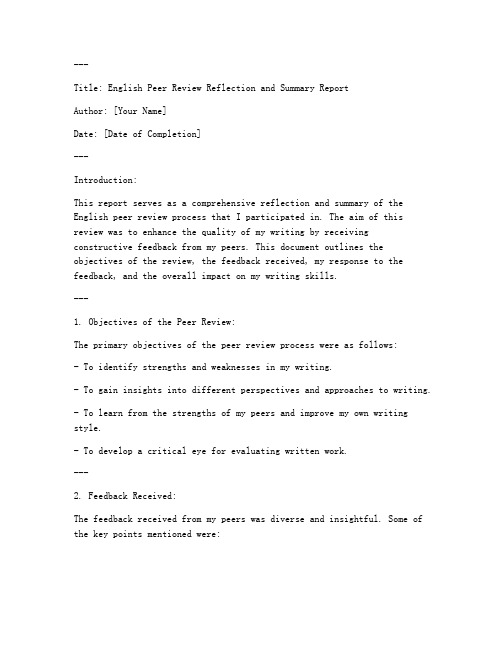
---Title: English Peer Review Reflection and Summary ReportAuthor: [Your Name]Date: [Date of Completion]---Introduction:This report serves as a comprehensive reflection and summary of the English peer review process that I participated in. The aim of this review was to enhance the quality of my writing by receivingconstructive feedback from my peers. This document outlines the objectives of the review, the feedback received, my response to the feedback, and the overall impact on my writing skills.---1. Objectives of the Peer Review:The primary objectives of the peer review process were as follows:- To identify strengths and weaknesses in my writing.- To gain insights into different perspectives and approaches to writing.- To learn from the strengths of my peers and improve my own writing style.- To develop a critical eye for evaluating written work.---2. Feedback Received:The feedback received from my peers was diverse and insightful. Some of the key points mentioned were:- Clarity: There were concerns regarding the clarity of my writing. Some paragraphs were found to be confusing and needed rephrasing for better understanding.- Grammar and Punctuation: There were minor grammatical errors and incorrect use of punctuation that needed correction.- Cohesion and Coherence: The flow of the essay needed improvement, with suggestions to use transitional phrases for better cohesion.- Structure: The structure of the essay was deemed slightly off-balance, with some sections being too lengthy while others were too brief.- Content: The content was generally strong, but there were suggestions to delve deeper into certain aspects and provide more evidence to support the arguments.---3. Response to Feedback:Upon receiving the feedback, I took the following actions:- Immediate Corrections: I immediately corrected any grammatical errors and adjusted the punctuation to ensure clarity and correctness.- Rephrasing: I rephrased certain paragraphs to improve clarity and made sure that the ideas were conveyed more effectively.- Structural Changes: I restructured the essay to ensure a more balanced flow and used transitional phrases to enhance cohesion.- Content Enhancement: I expanded on certain sections of the content and added relevant evidence to support my arguments.---4. Overall Impact:The peer review process had a significant impact on my writing skills:- Improved Writing Quality: My writing has become clearer, more grammatically correct, and well-structured as a result of the feedback received.- Enhanced Critical Thinking: The process has helped me develop acritical eye for evaluating written work, both my own and others'.- Increased Confidence: By receiving constructive criticism and making improvements, my confidence in my writing abilities has grown.- Networking: The peer review process has also allowed me to connect with my peers and learn from their experiences and perspectives.---Conclusion:In conclusion, the English peer review process was an invaluable experience that has greatly enhanced my writing skills. The feedback received was insightful and has led to tangible improvements in my writing. I am grateful for the opportunity to engage in this process and look forward to applying the lessons learned to future writing endeavors.---References:- [If applicable, list any sources or references used in the peer review process.]---Appendices:- [Any additional materials, such as the original draft, revised draft, or feedback forms, can be included here.]。
Tutorial notes on Self-Reflective Report
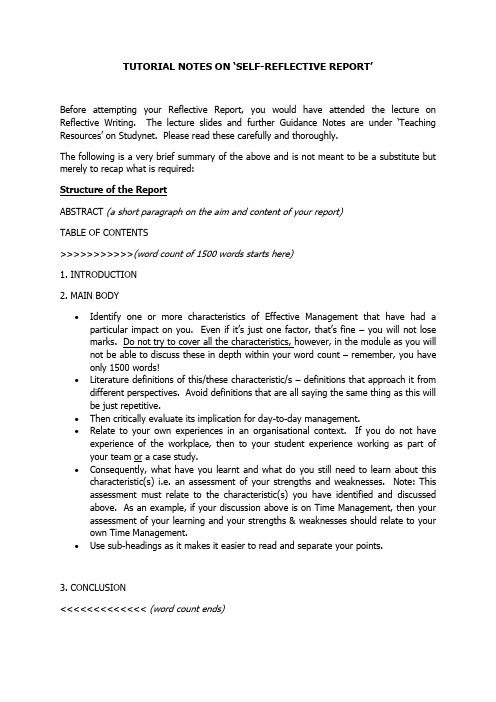
TUTORIAL NOTES ON ‘SELF-REFLECTIVE REPORT’Before attempting your Reflective Report, you would have attended the lecture on Reflective Writing. The lecture slides and further Guidance Notes are under ‘Teaching Resources’ on Studynet. Please read these carefully and thoroughly.The following is a very brief summary of the above and is not meant to be a substitute but merely to recap what is required:Structure of the ReportABSTRACT (a short paragraph on the aim and content of your report)TABLE OF CONTENTS>>>>>>>>>>>(word count of 1500 words starts here)1. INTRODUCTION2. MAIN BODY∙Identify one or more characteristics of Effective Management that have had a particular impact on you. Even if it’s just one factor, that’s fine – you will not lose marks. Do not try to cover all the characteristics, however, in the module as you will not be able to discuss these in depth within your word count – remember, you have only 1500 words!∙Literature definitions of this/these characteristic/s – definitions that approach it from different perspectives. Avoid definitions that are all saying the same thing as this will be just repetitive.∙Then critically evaluate its implication for day-to-day management.∙Relate to your own experiences in an organisational context. If you do not have experience of the workplace, then to your student experience working as part of your team or a case study.∙Consequently, what have you learnt and what do you still need to learn about this characteristic(s) i.e. an assessment of your strengths and weaknesses. Note: This assessment must relate to the characteristic(s) you have identified and discussed above. As an example, if your discussion above is on Time Management, then your assessment of your learning and your strengths & weaknesses should relate to your own Time Management.∙Use sub-headings as it makes it easier to read and separate your points.3. CONCLUSION<<<<<<<<<<<<< (word count ends)REFERENCES∙Use Harvard referencing.∙Only include references that you have used/quoted in your report.∙Must contain some valid literature references. You will lose marks if they are all just internet references. Wikipedia is not a literary source.APPENDICESACTION PLAN∙Based on your weaknesses and learning/skills requirements identified in your report.∙Laid out in a tabular form (see template in lecture slides)∙Headings are: Development area; Actions; Support Resources; Timescale to be achieved.Marking Criteria∙Degree of academic rigour∙Critical discussion/analysis∙Linking theory to practice∙Original thought and writing∙Well structured∙Alignment to the question set∙Harvard referencing∙Action PlanLearning Outcomes1. Knowledge and understanding.........of∙effective management attributes and their application∙managerial competencies2. Skills and attributes∙Intellectual skills (critical discussion; self-analysis on strengths and weaknesses) ∙Practical, professional and social skills (reflection on learning; application to a managerial context, action plan)∙Transferrable skills (clarity of thinking, communication through the structure and writing of your report)。
15分钟文化圈自查报告
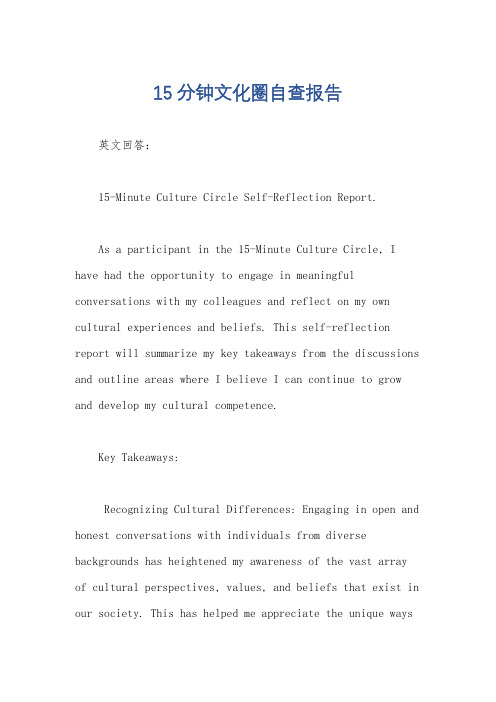
15分钟文化圈自查报告英文回答:15-Minute Culture Circle Self-Reflection Report.As a participant in the 15-Minute Culture Circle, I have had the opportunity to engage in meaningful conversations with my colleagues and reflect on my own cultural experiences and beliefs. This self-reflection report will summarize my key takeaways from the discussions and outline areas where I believe I can continue to grow and develop my cultural competence.Key Takeaways:Recognizing Cultural Differences: Engaging in open and honest conversations with individuals from diverse backgrounds has heightened my awareness of the vast array of cultural perspectives, values, and beliefs that exist in our society. This has helped me appreciate the unique waysin which people perceive and interpret the world, fostering greater empathy and understanding.Challenging Assumptions: Through active listening and critical thinking, I have challenged my own assumptions and biases. By questioning my perspectives and seeking alternative viewpoints, I have become more conscious of the limitations of my own cultural lens and the importance of embracing diverse perspectives.Building Bridges of Communication: The Culture Circle has facilitated the development of effective communication skills, enabling me to bridge cultural gaps and interact respectfully with individuals from different backgrounds. I have learned to listen attentively, ask clarifying questions, and express my thoughts in a culturallysensitive manner.Promoting Inclusivity: I recognize the importance of creating an inclusive environment where all voices are valued and respected. By fostering a culture of acceptance, we can empower individuals to share their perspectives andexperiences, ultimately contributing to a more diverse and equitable workplace.Continuous Learning: Cultural competence is an ongoing journey that requires continuous learning and self-reflection. I am committed to seeking opportunities to expand my knowledge and understanding of different cultures, both within and outside of the workplace.Areas for Growth:Deepening My Understanding of Cultural Nuances: WhileI have gained valuable insights into various cultural perspectives, I recognize the need to delve deeper into the complexities and nuances of different cultures. Through further research, personal interactions, and cultural immersion experiences, I aim to enhance my knowledge and develop a more comprehensive understanding.Improving My Communication Skills: Effective communication is crucial for building strong cross-cultural relationships. I plan to focus on improving my verbal andnonverbal communication skills, including active listening, paraphrasing, and using inclusive language. By honing these skills, I can ensure that I am communicating respectfully and effectively across cultural boundaries.Encouraging Cultural Exchange: I believe thatfostering a culture of cultural exchange is essential for promoting inclusivity and understanding. I will actively seek opportunities to engage in cross-cultural collaborations, participate in cultural events, and share my own cultural experiences with others.Advocating for Cultural Sensitivity: As a member of the workplace community, I am committed to advocating for cultural sensitivity and promoting equitable treatment for all. By speaking up against discriminatory behaviors and fostering a culture of respect, I can contribute to creating a more inclusive and supportive environment.Seeking Feedback and Support: I recognize the importance of seeking feedback and support from others as I continue my journey towards cultural competence. I willactively engage with mentors, colleagues, and cultural organizations to gain insights, explore new perspectives, and enhance my understanding.中文回答:15分钟文化圈自查报告。
酒店损坏物品心得体会范文
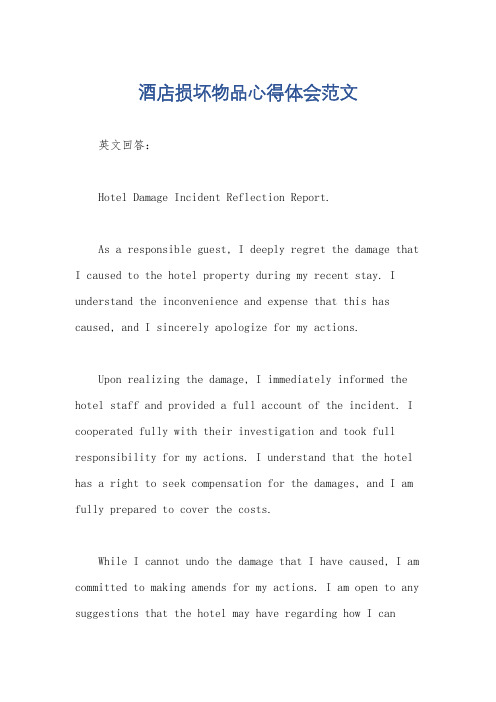
酒店损坏物品心得体会范文英文回答:Hotel Damage Incident Reflection Report.As a responsible guest, I deeply regret the damage that I caused to the hotel property during my recent stay. I understand the inconvenience and expense that this has caused, and I sincerely apologize for my actions.Upon realizing the damage, I immediately informed the hotel staff and provided a full account of the incident. I cooperated fully with their investigation and took full responsibility for my actions. I understand that the hotel has a right to seek compensation for the damages, and I am fully prepared to cover the costs.While I cannot undo the damage that I have caused, I am committed to making amends for my actions. I am open to any suggestions that the hotel may have regarding how I cancompensate for the damages.I have learned a valuable lesson from this incident. I now understand the importance of being cautious and respectful of hotel property. I will take steps in the future to ensure that I do not cause any further damage.I appreciate the hotel's understanding and willingness to work with me to resolve this matter. I am grateful for the opportunity to learn from my mistake and to make things right.中文回答:酒店损坏物品心得体会。
A Guide to Writing a Reflective Report
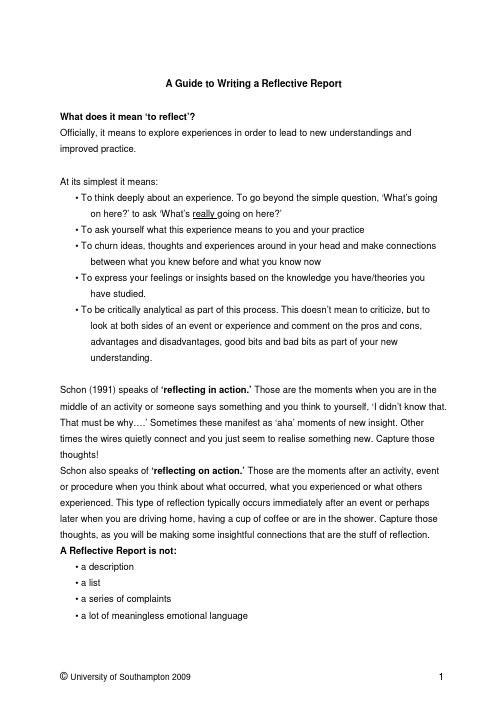
A Guide to Writing a Reflective ReportWhat does it mean ‘to reflect’?Officially, it means to explore experiences in order to lead to new understandings and improved practice.At its simplest it means:• To think deeply about an experience. To go beyond the simple question, ‘What’s going on here?’ to ask ‘What’s really going on here?’• To ask yourself what this experience means to you and your practice• To churn ideas, thoughts and experiences around in your head and make connections between what you knew before and what you know now• To express your feelings or insights based on the knowledge you have/theories you have studied.• To be critically analytical as part of this process. This doesn’t mean to criticize, but to look at both sides of an event or experience and comment on the pros and cons,advantages and disadvantages, good bits and bad bits as part of your newunderstanding.Schon (1991) speaks of ‘reflecting in action.’ Those are the moments when you are in the middle of an activity or someone says something and you think to yourself, ‘I didn’t know that. That must be why….’ Sometimes these manifest as ‘aha’ moments of new insight. Other times the wires quietly connect and you just seem to realise something new. Capture those thoughts!Schon also speaks of ‘reflecting on action.’ Those are the moments after an activity, event or procedure when you think about what occurred, what you experienced or what others experienced. This type of reflection typically occurs immediately after an event or perhaps later when you are driving home, having a cup of coffee or are in the shower. Capture those thoughts, as you will be making some insightful connections that are the stuff of reflection.A Reflective Report is not:• a description• a list• a series of complaints• a lot of meaningless emotional language• a considered view, in personal terms, of what an activity or new piece of information means to you or how it affects you. It is acceptable, even necessary, to write aboutyourself, your realizations, your feelings. Reflective writing requires evidence of what you have learned and what you will take away from the experience.In the report you are required to:• refer to, or give an example of, the activities or events that took place in the given context without being overly descriptive• reflect on these facts by stating how they affect you now or how you anticipate they may affect your future inter-professional practice• where appropriate include theories that support or give structure to your statements and reflectionsHere are some examples from previous papers of statements made by students, thinking they were being reflective, compared to some more fully developed reflective comments: Statement:• I knew I had some pre-conceived ideas about certain professions.Reflective comment:• I knew I had some pre-conceived ideas about certain professions. However, I wasseriously mistaken as these students were team players who did not take control but contributed effectively to the same standards as everyone else. I now see them in a new light, and my new attitude will no doubt affect my professional relationship with them for the better.Statement:• It is vital for health and social care professionals to work together to give the patient a positive experience.Reflective comment:• My main realization about other health and social care professionals was the way inwhich interaction between us is completely vital in order for patients to have positive health and social care experiences.Statement:• I had no idea prior to IPL week what Social Workers did.• For example, I was completely ignorant of the fact that Social Workers are sometimes involved in rehabilitation and long term care and assessment. I can see now that this could be useful for me in the future, as I will now know who to contact if I come across a patient needing this type of support.Statement:• Our group did not set any ground rules.Reflective comment:• As our group worked well from the start, we never felt the need to establish a written set of ground rules. If things had started to go wrong, I do feel that we would have taken the time out to establish a set of rules.Statement:• I came out as a Reflector in the Learning Styles Questionnaire.Reflective comment:• The Learning Styles Questionnaire indicated that my learning style is ‘reflective,’ which I think had something to do with my reluctance to participate in the week. Not knowing what was expected of me made me resistant to participation, but once I knew theparameters, I was eager to get stuck in. This probably goes for others like me. I’ll need to remember in the future the importance of setting out the parameters of a sessionearly on so people can feel comfortable.Statement:• I challenged the leader who was out of order in my opinion.Reflective statement:• At one point I challenged the leader about how we should present the information. This is not my usual way of acting. I’m usually shy in groups. I surprised myself that I was so bold. I think I gained the confidence to do this because the group was so friendly and supportive. This is something I need to consider as a member of any group, butespecially as a leader, that you get the best out of people in a supportive atmosphere.Some techniques to aid the process of reflection and reflective writingAssignment 3 in IPLU1 week B requires you to be both analytical and reflective.The Oxford Dictionary says that reflection refers to calm, lengthy and intent consideration, contemplation or musing. Essentially reflection is focused thinking of an evaluative type.Reflection involves being honest with yourself about your previous ignorance and your new learning, however enlightening or hard it was to face.Much reflective thinking takes place in your head. Few of us have time to go and write it down, though reflective journals are excellent practice and used widely by professionals and people generally to help them muster their thoughts and feelings and move forward in their life and profession. Recognising that you are reflecting is a useful realisation.New situations tend to make us self-aware and we become reflective and self-evaluative. In time we move out of the conscious incompetence stage and move into that unconscious competence that allows us to get on with what we do best not always aware of why or how we do it, rather like a competent driver.Questions are the key to reflection. You may well have found yourself reflecting-in-action as you experienced working in the team. Some people are good at recognising that they are reflecting, asking themselves questions such as ‘What’s really going on here?’ and evaluating as they go along.Some useful questions to ask yourself when reflecting on your work, your placements, your experiences of IPL weeks:• What would I do differently next time?• What have I learned about myself from this experience?• Could I avoid this situation another time?• What am I not facing up to in this situation?• What other choices do I have?• What would happen if I did nothing?• What haven’t I asked that I should ask?• What do I hope to achieve by doing that?• What do I feel about this new information?• How does it impact on me?• What have I learned about myself?• So what?Johns provides a model of structured reflection with some more useful questions to use when reflecting-in-action and on-action (Johns, 2004).REFERENCESJohns, C. (2004) Becoming a Reflective Practitioner (2nd ed). Oxford, Blackwell. Schon, Donald A. (1991) The reflective practitioner: how professionals think in action, Aldershot: Arena。
reflective report
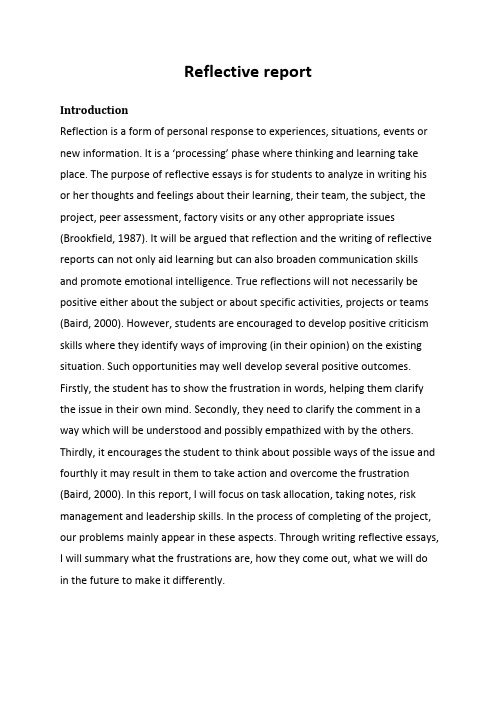
Reflective reportIntroductionReflection is a form of personal response to experiences, situations, events or new information. It is a ‘processing’ phase where thinking and learning take place. The purpose of reflective essays is for students to analyze in writing his or her thoughts and feelings about their learning, their team, the subject, the project, peer assessment, factory visits or any other appropriate issues (Brookfield, 1987). It will be argued that reflection and the writing of reflective reports can not only aid learning but can also broaden communication skills and promote emotional intelligence. True reflections will not necessarily be positive either about the subject or about specific activities, projects or teams (Baird, 2000). However, students are encouraged to develop positive criticism skills where they identify ways of improving (in their opinion) on the existing situation. Such opportunities may well develop several positive outcomes. Firstly, the student has to show the frustration in words, helping them clarify the issue in their own mind. Secondly, they need to clarify the comment in a way which will be understood and possibly empathized with by the others. Thirdly, it encourages the student to think about possible ways of the issue and fourthly it may result in them to take action and overcome the frustration (Baird, 2000). In this report, I will focus on task allocation, taking notes, risk management and leadership skills. In the process of completing of the project, our problems mainly appear in these aspects. Through writing reflective essays, I will summary what the frustrations are, how they come out, what we will do in the future to make it differently.Main bodyIn retrospect I feel that I have learnt many invaluable lessons from undertaking the project and there are many things need to improve or do differently. Firstly, the most obvious thing that I discovered was the advantage of working as part of a group. I learned that good teamwork is the key to success in design activities when time and resources are limited. As everyone had their own point of view, many different ideas could be produced and I found the energy of group participation made me feel more energetic about contributing something. Rosefeld and Wilson(1999) point the importance of allocating individual roles to enable the division of labour and therefore increase the effect within a team. In our project, our leader allocated roles to share workload throughout the project. George and I tried to find the tuition changes in 2007, Alpensh and Thung found some information in other countries, Derek and Chris tried to build the model based the data we collected. Through the allocation, workload decreased dramatic. However, in practice, we found that a natural shift always occurred when we tried to find some data in individual areas, for example: I found the data describe the changes in 2007, which also can be used in building models. So I can email that information to them. By this way, we can cooperate and support each other. On the other side, it is important to establish the team role “type” because each type of team worker has implicit attributes and characteristics (Sch?n, 1987). Identifying these attributes and characteristics could aid my identification of current weaknesses and strengths, and could further support the thoughts and opinions expressed in the rest of the report. Belbin (1996)identified eight types of team worker by using a self-perception questionnaire that enables individuals to identify their team working type or role. In our group project, we just allocated our tasks by random, which bring some drawbacks to us. Forexample: some mates cannot finish their part, because they are not good at math and they cannot find enough evidence to support their arguments. Even for me, I think I am not good at stating the changes of tuition fee in the UK. Because English is my second language, I cannot use it so professionally, especially for some complex sentences or authority report. However, I am good at math and I have studied many related financial courses in my undergraduate degree, so I am pleased to build the model and do the statistics. In addition, we apply our knowledge to solve the problems in real life, which bring much pleasure to us and help us to have a deep understand of the theories in note books. In this project, we collected data by using database, used Eviews and SPSS to build models, then analyse the data and do some forecast by the knowledge we were taught in Economic evaluation technique course.Secondly, I found the note taking process itself helpful, as it ensured that I listened carefully and decoded information. The notes were written by handon paper. They consisted of simple notes and personal notes that would remind me of specific things when it came to writing the notes up. I took some direct notes recording what I saw where this was relevant to the research questions and, I also made some notes from our group mates. Not all the information I recorded was relevant, but noting what I found informative useful or contributed to my part of the final report. However, the reliability of simple notes alone can be questionable. For example, the notes were not a direct transcription of what the journal or article said but consisted of useful information or interesting information. Besides that, English is my second language. Through my low level of paraphrasing, it may change the meaning. Some technical information was difficult to note down accurately. Forexample: Sometimes I misunderstood what our leader mean and made notes, which always brought many troubles to me. When I used unappreciated or wrong words to show my ideas, our group mates also misunderstood. Usually as I do not have enough time to copy or record the sentence directly, just notes the bullet points, which also decreases the reliability of notes. If we have the chance to complete the project again, a tape recorder would have been a better, more accurate method. However, if students use a tape recorder, they are possible to be asked to switch it off by participants who were uneasy about her comments being directly recorded. It seems that subjects feel differently about being recorded or photographed, so specific consent should be sought before using these technologies. Besides that, I discovered that even the simplest things on earth could be turned into something amazing if we put enough creativity and effort into working on them. In our project, at first I know nothing about the company “cotton mill”, and I am not interested in education aspect, I feel that the project will be so boring. However, after we meet the clients, they gave us so many interesting topics and information. We all find the tasks challenging and are able to create some ‘cool stuff’ for the clients. During those times, our group mates cooperated with each other and challenged each other’s preconceptions about what structure the final report should be. Based on the research, I learn much about the student accommodation market in the UK and the changes of tuition fee policy. In our presentation, our clients were quite pleased with our research and thought the recommendations are useful for their company.Thirdly, I noted risk management vital for the whole project, as it ensured that the research can be done on time and in high quality. A risk is anything that can cause you either to fall short of, or to exceed your project targets. Anegative risk is something that could potentially have a detrimental effect on one or more of the project objectives. In our group, there are several risks (Mallon, 1984). For example: absenteeism. Because our group leader works in Newcastle, he only has little time available for our group meeting. Chris took part in CFA test and he only had limited time for this project. Alpense also spent much time on part- time job. Besides that, during that time, we also have some courses need to attend. So the meeting time is hard to decide. Sometimes the meeting was forced to be cancelled. Another risk is the allocated tasks cannot be finished on time or written in low quality. Almost every meeting, there was someone cannot finish his allocated part or our group leader was not satisfied with our writing. This situation delayed our progress, which may cause that we cannot submit the report on time. After identifying the risks, we should do risk management and take risk mitigation strategies. Risk management evaluates which risks identified in the risk assessment process require management and selects and implements the plans or actions that are required to ensure that those risks are controlled (Sandars, 2009). In the future, if the same problems occur, we will treat these risks differently. At first, identify risks. What are the risks? Who are the individuals responsible for implementing the risk mitigation? Why is it important to take this risk in relation to the project objectives? How is the risk going to be mitigated? After that, make risk management plan. To detail the strategies to minimize the risks, develop it in the conception and design stages of your project, communicate about project risks early and often, record all the documents about the risks. In practice, we often talked about those problems by email and found the solutions. Even sometimes it does not work. However, in the last we finished the work successfully. If we have a choice to do the project again, we should make notes, record who should be responsible forthe risks ; give him/them warning; explain in detail the nature of the risk (such as: its likelihood, its affect etc.); force him to stop it.Fourthly, leadership is the key to the success of team work. An effective leader needs an incredible amount of project background information for his/her organization. In our group, group leader is local people; he is affected by the tuition fee policy, and he has much more background information than us, so he is suitable to be our team leader. To be honest, we are not familiar with the education system of the UK. Besides that, an effective leader will listen to information that is difficult to hear. Many failures in decision-making are easily tracked back to the failure of a leader (Mayer & Salovey, 1995). In our group, there is one problem due to the difference between English and Chinese style. For Chinese students, we think we should have many meeting and try our best to finish the project as soon as possible. For local students, they prefer to contact by email instead of meeting, and they think we only need to finish the project before the deadline. Each way has some advantages and disadvantages; it is hard to say which one is better. At last, our group took the English style. Because some group mates already got job, they spend most time in their job. This situation causes one problem. After each group member finished their part of work and upload it in NOW, we only have short time to put all the content together. So we all think if we have more time, we can do it better. In my opinion, the best conflict resolution results from discussing the issues, listening to each group mates and providing constructive feedback. Even without so many meeting, we should upgrade our progress every day and try to contribute to our group. There are fundamental qualities that every team member should possess to enable him/ her to work effectively as part of team. After that, a good leader should make plans for all the team work andallocate all the tasks to the team members. The more we plan things, the more confident we feel about our ability to effectively take control of a situation. A good example of this happened recently. As the project is coming to an end, we need to submit the final report before the deadline. At the same time, the report of financial modelling (our major course) also must be finished soon. There is a conflict between the two reports. In order to complete all the tasks before the deadline, we produced a time-line activity plan and discussed this with the team. Through this way, we finish the reports on time. However, as I mentioned before, we only have little time to go review it. As a whole, our group leader is a successful leader. He took control of the project by setting out our objectives and encouraging the group to focus on the task ahead. Then he organised the structure of the report, delegated tasks and set time plans and deadlines. He is responsible for the whole project. The only drawback is lack of effective communication between leader and group mates.ConclusionIn summary, I have learnt many invaluable lessons from undertaking the project and on reflection I really feel that I have improved my ability. Firstly, from this project, we apply our knowledge to solve the problems in the real world. So we can have a deep understand of the related theory. Secondly, every team member should possess to enable him/her to work effectively as part of a team. We should avoid freeloader and take responsibility for the group. Besides that, leadership is so important for the successful of teamwork. Successful leadership is the foundation of the team cooperation. Effective communication is the effective way to solve the conflict between leader and group members. The fourth, risk management should be well prepared before the project started and avoid the things which can be solved at the beginning of the project. In the future, if we have the chance to complete the projectagain there are many things that I would do differently. I will establish the team role ‘type’ that I best conform to because each type of team worker has implicit attributes and characteristics. I will solve the conflicts between our group mates through effective communication or democratic way. I will also well preparation of the risk management of projects through make detailed risk management plan.ReferenceBaird, M. (2000). Developing critical thinkers: challenging adults to explore alternative ways of thinking and acting, Open University Press, Milton Keynes.Belbin,S. (1996). Mezirow, J 1990, Fostering critical reflection in adulthood: a guide to transformative and emancipatory learning, Jossey- Bass, San Francisco.Brookfield, S. (1987).Towards the development of a reflective radiographer: challenges and constraints. London: Edward ArnoldMallon, T. (1984). A book of one's own: People and their diaries. Picador Books.Mayer, J. D., & Salovey, P. (1995). Emotional intelligence and the construction and regulation of feelings. Applied and Preventive Psychology, 4(3), 197?2008. Rosefeld, T. H., & Wilson, A. P. (1999). College students' time management: Correlations with academic performance and stress. Journal of Educational Psychology, 82(4), 760?768.Sandars, J. (2009). The use of reflection in education:AMEE Guide No. 44. Med Teach.Sch?n, DA. (1987). Educating the reflective practitioner, Jossey-Bass. San Francisco.AppendicesDear TeamAlpesh has managed to quickly and effieciently set up a number ofrequired folders on the shared space on the NOW. If everyone can nowdownload complete and upload your own personal information template.This will fulfill two of the requirements on the sheet we were givenyesterday and i believe we should have no problem completing theothers by the end of tomorrow.Alpesh has also uploaded the contact list, we are one email addressmissing, i will text Kai Wang and get him to update this. I will alsoupdate this with my correct email address (i wrote it down wrong).If you could also just reply to this email once you have done thepersonal information template and just to confirm that you haverecieved this email.Any problems, just contact me.ThanksGeorgeAgenda Meeting18th May 9amChair of meeting – George StantonMinutes to be taken by Alpesh DivechaAll group members to be present.•Introduction and apologies•Roles and rulesDiscussion and outline of the roles of the group and communication procedures going forward including; Liaison with cotton mills, Liaison with supervisor. Weekly procedure in regards to minutes agendas and updating of group shared file space.•Cotton MillsGroup to report back and collate findings from research into Cotton Mills.•The BriefGroup discussion into the brief point by point with the intention of formulating broad plan for the project going forward. This should also include discussion into deadlines.•Sources of information and DataAgreement on any potential external sources of data that need to be explored and who will be responsible where necessary for contacting and gathering this information.•Meeting with clientFull discussion of the requirements for the meeting with the client, formulation of questions, agreement on presentation. Suggested pre-meeting meeting day before the client meeting to bring together final plan.•Any other business.•Agenda of the Meeting•held on 25/05/2011•To attend: Trung Le•Mingwei Ding•Kai Wang•Haijiang Dong•George Stanton••Chair/facilitator: George Stanton••Note taker: George Stanton••Apologies for Absence•Alpesh is unable to attend.••Actions from Previous Meeting•Questions for client meeting from the group.•Final details finalised for meeting.••Part A – Matters for Decision•Final list of questions to be decided upon.••Part B – Matters for Discussion••Any Other Business•••Next meeting Date:25/05/2011•Time: 9am (meeting 8.30 at boots library)•Location Cotton Mills Office•Chair: George Stanton•Note taker: AlpeshMeeting with Cotton Mills 24/05/11General outline of the project and initial thoughts of the team of the different aspects of the project.In general;As outlined in the draft brief the focus of the of this report is the consequences of the 2012 tuition fee rise on cotton mills student accommodation.Below are the details of different aspects of this project as detailed by the draft brief and the initial response of this group keeping in mind the time scale scope and size of this report.•What economic/financial modelling has been undertaken already? What were the findings?o It is the belief of this report that this section will consist of a literature review covering the subject of higher education fees and theirrelationship with student numbers.o Where literature exists that focuses on the potential effects of tuition fees on the demand for student accommodation this literature will alsobe used.o However, it seems less likely that this subject will be specificallycovered in many reports.o The group will aim to find assess and literature from academicjournals government and local government reports, collect and collatethe information present any findings significant to the specific case ofCotton Mills.•How have changes to fee structures in other countries affected the demand for university courses and hence accommodation?o Identification of countries where tuition fees have beenintroduced. Examination of any reported effects of the tuition feeincreases, both of the number of students and the proportion ofstudents deciding not to more away to study.o This too is likely to take form as a research and literature review and once again it is likely that any evidence will focus morebroadly on the number of students rather than those studentsseeking accommodation.o Where available; evidence regarding the number of studentsseeking accommodation will be prioritised.•How did the changes in fees in the UK in 2006 affect demand?o This aspect of the project will allow for the examination of the effects of previous tuition fee increases.o This will focus on the effects of the 2006 tuition fee increase on student numbers nationally, within Nottingham and atNottingham Trent University.o If Cotton Mills was in business prior to 2006, an analysis of the primary data may be possible.•Are there local indicators that may help to model trends in Nottingham?o This section of the report will explore the possible localindicators that may also provide information into the potentialchanges in the demand for student accommodation.o Preliminary this may include; house prices, accommodationrates, the velocity of the housing market within student areasand local GDP. This may also include University providedinformation on student applications and applications forUniversity provided accommodation.•What alternative sources of customers may be available?o A study of the private non student rental market, averagerents, demand, supply and facilities offered. This may includean initial cost benefit analysis of converting cotton mills andtargeting an alternative market.Questions For Cotton Mills Re Draft BriefFollowing this brief outline of the project as initially set out above are there any alterations and additions to the general direction stated?Does Cotton Mills have an area of the report, as set out by the draft brief, that it would like be given special emphasis by the team, within the report?Is it the expectation of Cotton Mills that the report follow a more quantitative and statistical approach or a more qualitative and business focussed approach?Meeting with Cotton Mills 24/05/11General outline of the project and initial thoughts of the team of the different aspects of the project.In general;As outlined in the draft brief the focus of this report is the consequences of the 2012 tuition fee rise on cotton mills student accommodation.Below are the details of different aspects of this project as detailed by the draft brief and the initial response of this group keeping in mind the time scale scope and size of this report.•What economic/financial modelling has been undertaken already? What were the findings?o It is the belief of this report that this section will consist of a literaturereview covering the subject of higher education fees and theirrelationship with student numbers.o Where literature exists that focuses on the potential effects of tuitionfees on the demand for student accommodation this literature will alsobe used.o However, it seems less likely that this subject will be specificallycovered in many reports.o The group will aim to find assess and literature from academicjournals government and local government reports, collect and collatethe information present any findings significant to the specific case ofCotton Mills.Reflection from meetings:-Phil was happy with the broad outline put forward of this aspect of the project. Expectation have been outlined and in regards to the ability of the group to conduct primary data research.Action going forward research for literature review – this particular bullet point is the broadest. All of the team should be conducting research into what studies reports and academic journals are available on this bullet point. Specifically this research is the main priority for Chris and Derek over the next week. Once Alpesh has gone over the minutes and recording of the meeting any additional views expressed can be communicated to the team. Broadly this bullet point should look into the elasticity of demand for Nottingham Trent University education in order to assess the potential effects of the tuition fee increases on CM.•How have changes to fee structures in other countries affected the demand for university courses and hence accommodation?o Identification of countries where tuition fees have beenintroduced. Examination of any reported effects of the tuition feeincreases, both of the number of students and the proportion ofstudents deciding not to more away to study.o This too is likely to take form as a research and literature review and once again it is likely that any evidence will focus morebroadly on the number of students rather than those studentsseeking accommodation.o Where available; evidence regarding the number of studentsseeking accommodation will be prioritised.Much like the above bullet point this section will be a review of theliterature but focusing on other countries where similar tuition feeincreases have been introduced. Once again it is expected that we may be able to extract information on the effect of tuition fee increases on student numbers in general but it is unlikely that information specific toaccommodation will be available.Actions :- Responsibility for researching and information gathering on this point has been allocated to Alpesh and Trung. For reporting back at next weeks, weekly meeting.How did the changes in fees in the UK in 2006 affect demand?o This aspect of the project will allow for the examination of theeffects of previous tuition fee increases.o This will focus on the effects of the 2006 tuition fee increase onstudent numbers nationally, within Nottingham and atNottingham Trent University.o If Cotton Mills was in business prior to 2006, an analysis of theprimary data may be possible.Third specific area of research, gathering of reports, articles and data reports on the impact of the 2006 tuition fee increase on student numbers. Research to also potentially include contact with NT admissions and accommodation department for before and after 2006 data.The above three bullet points were highlighted by CM as those of highest priority and should receive the greatest amount of emphasis in our report. For this reason these three areas of research will be the first areas of concentration for the group. All of this research is to be shared within the group and presented by the separate pairs in next meeting.•Are there local indicators that may help to model trends in Nottingham?o This section of the report will explore the possible localindicators that may also provide information into the potentialchanges in the demand for student accommodation.o Preliminary this may include; house prices, accommodationrates, the velocity of the housing market within student areasand local GDP. This may also include University providedinformation on student applications and applications forUniversity provided accommodation.•What alternative sources of customers may be available?o A study of the private non student rental market, averagerents, demand, supply and facilities offered. This may includean initial cost benefit analysis of converting cotton mills andtargeting an alternative market.Additionally to the above actions (in bold) it is also agreed that Trung touches down with the international office to see if they have data relevant to this project. George will contact NTU admissions department to enquire whether they are willing to provide data on student applications and as discussed any research they may have conducted on future student numbers.Chris Derek and Min are to conduct research into CM their competitors both university run and private; with the view of assessing the comparative strengths and weaknesses of CM in a potentially increasingly competitive market.Questions For Cotton Mills Re Draft BriefFollowing this brief outline of the project as initially set out above are there any alterations and additions to the general direction stated?Does Cotton Mills have an area of the report, as set out by the draft brief, that it would like be given special emphasis by the team, within the report?Is it the expectation of Cotton Mills that the report follow a more quantitative and statistical approach or a more qualitative and business focussed approach?What if any market research have you conducted or commissioned in the past?LogisticsHow often would you like to meet up/ receive an email update from the group?How and who is best to contact if we need information from Cotton Mills?。
工作总结用什么词语代替
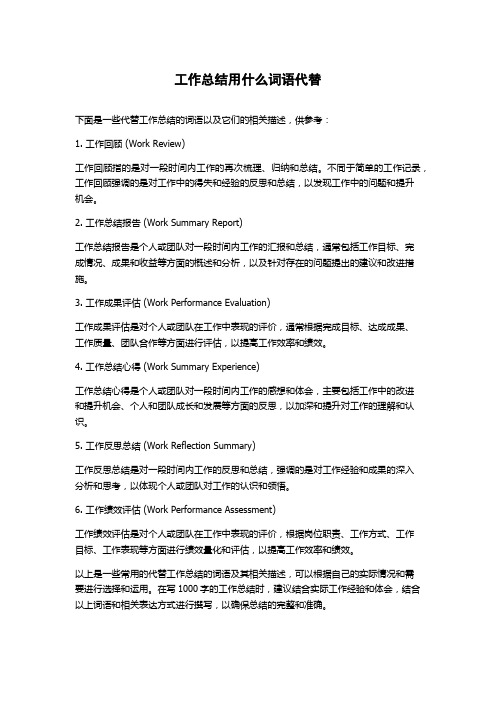
工作总结用什么词语代替下面是一些代替工作总结的词语以及它们的相关描述,供参考:1. 工作回顾 (Work Review)工作回顾指的是对一段时间内工作的再次梳理、归纳和总结。
不同于简单的工作记录,工作回顾强调的是对工作中的得失和经验的反思和总结,以发现工作中的问题和提升机会。
2. 工作总结报告 (Work Summary Report)工作总结报告是个人或团队对一段时间内工作的汇报和总结,通常包括工作目标、完成情况、成果和收益等方面的概述和分析,以及针对存在的问题提出的建议和改进措施。
3. 工作成果评估 (Work Performance Evaluation)工作成果评估是对个人或团队在工作中表现的评价,通常根据完成目标、达成成果、工作质量、团队合作等方面进行评估,以提高工作效率和绩效。
4. 工作总结心得 (Work Summary Experience)工作总结心得是个人或团队对一段时间内工作的感想和体会,主要包括工作中的改进和提升机会、个人和团队成长和发展等方面的反思,以加深和提升对工作的理解和认识。
5. 工作反思总结 (Work Reflection Summary)工作反思总结是对一段时间内工作的反思和总结,强调的是对工作经验和成果的深入分析和思考,以体现个人或团队对工作的认识和领悟。
6. 工作绩效评估 (Work Performance Assessment)工作绩效评估是对个人或团队在工作中表现的评价,根据岗位职责、工作方式、工作目标、工作表现等方面进行绩效量化和评估,以提高工作效率和绩效。
以上是一些常用的代替工作总结的词语及其相关描述,可以根据自己的实际情况和需要进行选择和运用。
在写1000字的工作总结时,建议结合实际工作经验和体会,结合以上词语和相关表达方式进行撰写,以确保总结的完整和准确。
反思报告模板英语
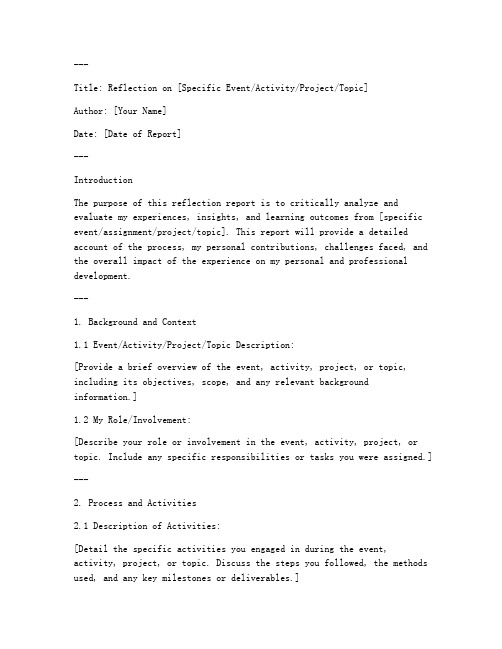
---Title: Reflection on [Specific Event/Activity/Project/Topic]Author: [Your Name]Date: [Date of Report]---IntroductionThe purpose of this reflection report is to critically analyze and evaluate my experiences, insights, and learning outcomes from [specific event/assignment/project/topic]. This report will provide a detailed account of the process, my personal contributions, challenges faced, and the overall impact of the experience on my personal and professional development.---1. Background and Context1.1 Event/Activity/Project/Topic Description:[Provide a brief overview of the event, activity, project, or topic, including its objectives, scope, and any relevant background information.]1.2 My Role/Involvement:[Describe your role or involvement in the event, activity, project, or topic. Include any specific responsibilities or tasks you were assigned.]---2. Process and Activities2.1 Description of Activities:[Detail the specific activities you engaged in during the event, activity, project, or topic. Discuss the steps you followed, the methods used, and any key milestones or deliverables.]2.2 Challenges Faced:[Identify and describe any challenges or obstacles you encountered during the process. Discuss how you addressed these challenges and any lessons learned.]2.3 Support and Resources:[Discuss any support or resources you utilized to overcome challenges or enhance your performance. Include feedback from mentors, colleagues, or other sources.]---3. Personal Insights and Learning Outcomes3.1 New Knowledge and Skills:[Reflect on what new knowledge or skills you acquired during the experience. Provide specific examples of how you applied these new learnings.]3.2 Personal Growth:[Discuss how the experience contributed to your personal growth. Consider aspects such as self-awareness, resilience, and emotional intelligence.]3.3 Reflection on Attitudes and Values:[Examine how your attitudes and values were influenced or challenged by the experience. Discuss any shifts in perspective or beliefs.]---4. Critical Analysis4.1 Strengths and Areas of Improvement:[Analyze your performance, highlighting your strengths and areas for improvement. Be specific about the evidence supporting your analysis.]4.2 Impact on Others:[Consider the impact of your actions or contributions on others involved. Discuss any positive or negative effects and how you can improve in the future.]4.3 Overall Evaluation:[Provide an overall evaluation of the experience, considering its value, relevance, and your satisfaction with the outcomes.]---5. Conclusion and Recommendations5.1 Summary:[Summarize the key points of your reflection, emphasizing the most significant insights and learning outcomes.]5.2 Recommendations for Future:[Based on your reflection, offer recommendations for how you can apply these learnings to future events, activities, projects, or personal development.]5.3 Action Plan:[Outline a concrete action plan for implementing the recommendations and further enhancing your skills and knowledge.]---Acknowledgments[If applicable, acknowledge any individuals, organizations, or resources that contributed to your learning and development during the experience.]---End of Report---This template serves as a guide for structuring your reflection report. Feel free to adapt and expand upon the sections to best fit the context of your specific experience.。
英语生涯反思报告模板
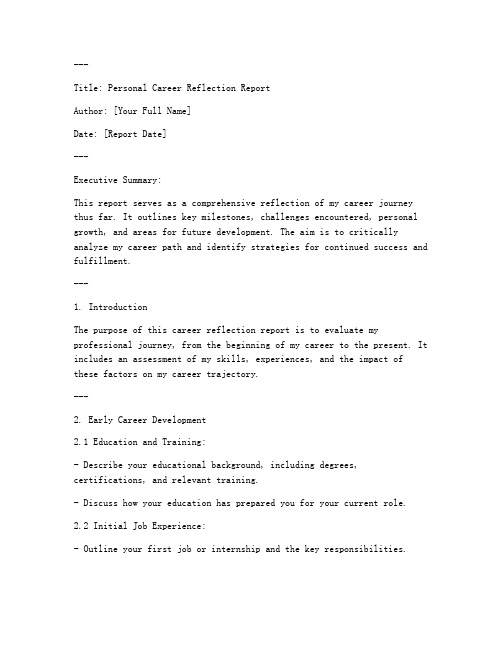
---Title: Personal Career Reflection ReportAuthor: [Your Full Name]Date: [Report Date]---Executive Summary:This report serves as a comprehensive reflection of my career journey thus far. It outlines key milestones, challenges encountered, personal growth, and areas for future development. The aim is to critically analyze my career path and identify strategies for continued success and fulfillment.---1. IntroductionThe purpose of this career reflection report is to evaluate my professional journey, from the beginning of my career to the present. It includes an assessment of my skills, experiences, and the impact of these factors on my career trajectory.---2. Early Career Development2.1 Education and Training:- Describe your educational background, including degrees, certifications, and relevant training.- Discuss how your education has prepared you for your current role.2.2 Initial Job Experience:- Outline your first job or internship and the key responsibilities.- Reflect on what you learned during this period and how it shaped your career path.3. Key Milestones and Achievements3.1 Professional Progress:- List significant promotions, projects, or roles you have held.- Detail the achievements associated with each milestone.3.2 Skills and Competencies:- Identify the skills and competencies you have developed throughout your career.- Provide examples of how these skills have contributed to your professional success.---4. Challenges and Lessons Learned4.1 Professional Challenges:- Discuss any significant challenges you have faced in your career.- Analyze how you overcame these challenges and what you learned from them.4.2 Personal Growth:- Reflect on how these challenges have contributed to your personal development.- Explain how you have applied these lessons to your professional life.---5. Areas for Improvement and Development5.1 Skill Gaps:- Identify any skill gaps or areas where you feel less confident.- Describe how you plan to address these gaps through further education, training, or practical experience.5.2 Career Goals:- Set clear short-term and long-term career goals.- Discuss the steps you will take to achieve these goals.---6. Impact on the Organization6.1 Contributions:- Describe how your work has positively impacted your organization.- Provide specific examples of your contributions and their outcomes.6.2 Team Dynamics:- Reflect on your interactions with colleagues and how you have contributed to a positive team environment.---7. ConclusionThis career reflection report has provided me with valuable insightsinto my professional journey. It has highlighted the importance of continuous learning, adaptability, and resilience. As I move forward, I am committed to leveraging these lessons to further enhance my career and contribute positively to my organization.---8. Appendices- Include any additional documents or evidence that support the content of your report, such as performance evaluations, certificates, orletters of recommendation.---9. References- List any external sources or literature that were referenced in the report.---This template can be customized to fit your specific career journey and reflection needs. Remember to be honest, reflective, and forward-thinking in your analysis to gain the most benefit from this exercise.。
英语竞赛反思总结报告模板
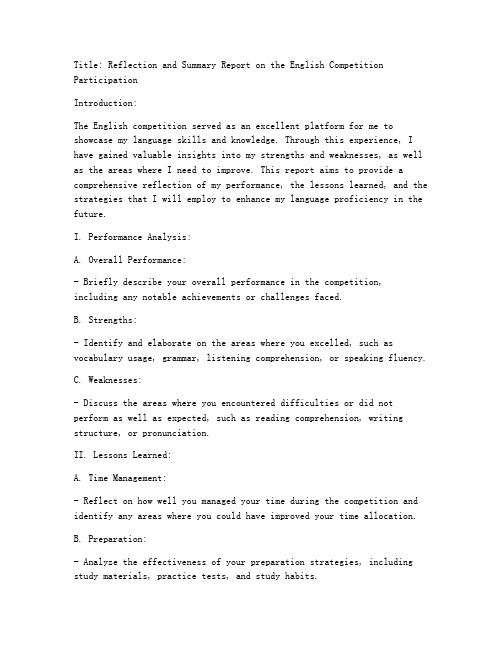
Title: Reflection and Summary Report on the English Competition ParticipationIntroduction:The English competition served as an excellent platform for me to showcase my language skills and knowledge. Through this experience, I have gained valuable insights into my strengths and weaknesses, as well as the areas where I need to improve. This report aims to provide a comprehensive reflection of my performance, the lessons learned, and the strategies that I will employ to enhance my language proficiency in the future.I. Performance Analysis:A. Overall Performance:- Briefly describe your overall performance in the competition,including any notable achievements or challenges faced.B. Strengths:- Identify and elaborate on the areas where you excelled, such as vocabulary usage, grammar, listening comprehension, or speaking fluency.C. Weaknesses:- Discuss the areas where you encountered difficulties or did not perform as well as expected, such as reading comprehension, writing structure, or pronunciation.II. Lessons Learned:A. Time Management:- Reflect on how well you managed your time during the competition and identify any areas where you could have improved your time allocation.B. Preparation:- Analyze the effectiveness of your preparation strategies, including study materials, practice tests, and study habits.C. Mindset and Stress Management:- Discuss how your mindset and stress management skills affected your performance, and consider any techniques you can employ to handle pressure better in future competitions.III. Strategies for Improvement:A. Study Techniques:- Outline specific study techniques you will adopt to enhance your language skills, such as regular vocabulary building, reading diverse texts, or practicing writing exercises.B. Practice and Application:- Describe how you plan to apply your skills in real-life situations, such as engaging in English conversations, watching English movies, or participating in language exchange programs.C. Professional Development:- Consider any additional resources or courses that could help you improve your English proficiency, such as joining a language club, seeking a tutor, or attending workshops.IV. Conclusion:The English competition has been a transformative experience that has not only tested my language skills but also challenged my personal growth. Through this reflection, I have gained a clearer understanding of my strengths and weaknesses, and I am committed to addressing the areas that require improvement. By implementing the strategies outlined in this report, I am confident that I will continue to develop my English proficiency and achieve greater success in future competitions and language-related endeavors.Acknowledgments:I would like to express my gratitude to the organizers of the English competition for providing this valuable opportunity. I would also liketo thank my teachers, family, and friends for their continuous support and encouragement.---Please note that this template is a general guide and should be customized to reflect your personal experiences and learning outcomes.。
selfreflection范文

Self-reflection report咋写啊self-reflective report的写作结构:首先是abstract,需要用一小段简明扼要的说明你self-reflective report的目的和主要内容接着是table of contents(字数的计算从下面开始)1.introduction2.main body*找到对你有重要影响的一点或几点有助于有效管理品质。
不求多,即使就一点也无关紧要。
因为你字数有限,不能进行深入探讨。
*对这些品质从不同角度进行定义,要避免重复。
*批判性评估这些品质在你每天生活中体现。
*结合下你在组织环境中一些经历谈论下。
如果没有工作经验,你可以结合你学习经历,如和你同伴进行group work。
*紧接着,你需要说明你所学习到的和你仍然需要学习的一些品质。
这些评估必须结合你上文中提到并讨论的一些个人特点。
*建议拟定一些副标题,方便老师阅读和划分你的观点3.conclusion对你的self-reflective report作业总结,相比abstract部分应该更具体,更细致,当然你可以写下对将来的学习规划做一些规划和打算。
以上就是字数计算截止部分,下面的内容是不计算在字数之内的:references.*用哈佛引用格式*只包括你在这篇报告中的一些内容的引用action plan*要基于你在报告中提到的缺点和学习/技能要求*以表格的形式展现*headings:发展方面;支撑资源;实现时间表以上内容来自meeloun教育网贡献,望采纳!self-reflection是什么意思self-reflection英 [selfrɪflekʃən]美 [selfrɪflekʃən]n.反省网络:自我反省;自省;自我反思;自我反映派生词:self-reflective1. He has never exhibited the self-confidence, bordering on arrogance, of his predecessor.他从未表现出他前任的那种近乎傲慢的自信。
单位职工违法犯罪反思报告范文
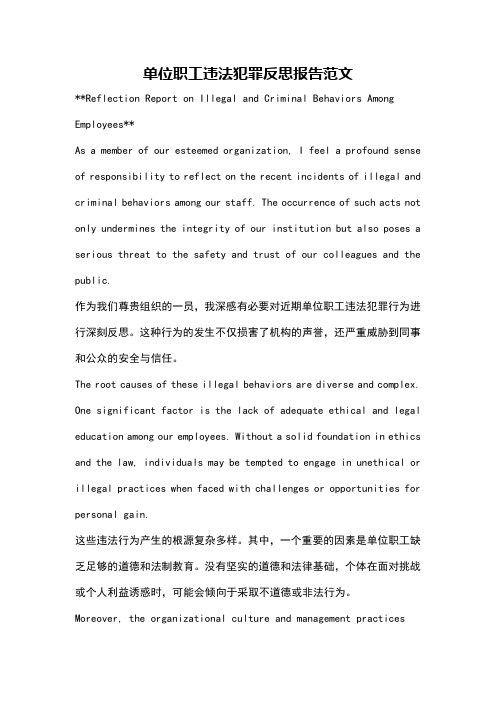
单位职工违法犯罪反思报告范文**Reflection Report on Illegal and Criminal Behaviors Among Employees**As a member of our esteemed organization, I feel a profound sense of responsibility to reflect on the recent incidents of illegal and criminal behaviors among our staff. The occurrence of such acts not only undermines the integrity of our institution but also poses a serious threat to the safety and trust of our colleagues and the public.作为我们尊贵组织的一员,我深感有必要对近期单位职工违法犯罪行为进行深刻反思。
这种行为的发生不仅损害了机构的声誉,还严重威胁到同事和公众的安全与信任。
The root causes of these illegal behaviors are diverse and complex. One significant factor is the lack of adequate ethical and legal education among our employees. Without a solid foundation in ethics and the law, individuals may be tempted to engage in unethical or illegal practices when faced with challenges or opportunities for personal gain.这些违法行为产生的根源复杂多样。
Reflective report
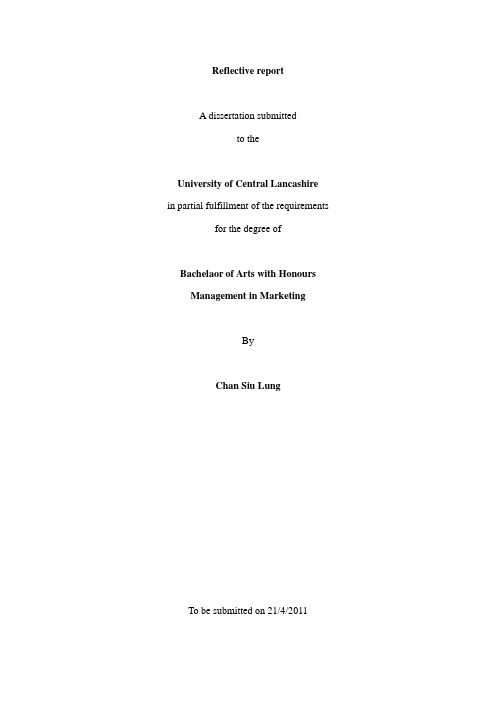
Reflective reportA dissertation submittedto theUniversity of Central Lancashire in partial fulfillment of the requirementsfor the degree ofBachelaor of Arts with HonoursManagement in MarketingByChan Siu LungTo be submitted on 21/4/2011SummaryAccording to the assessment two, I had written a study plan about in my last learning year. So I am now going to write a reflective report on the study plan that I had done. I will provide some example of what effective study plan is and how it can help on my personal development. Then I will according to what I have researched to give out some suggestion and recommendation.IntroductionOn the date 18th April, 2011 I had submitted a study plan. In the study plan I had mentioned the reasons that I choose marketing, the method I would use in my studies and also the job that I want to find in the future can practice the knowledge that I have learnt.In this report, I will talk about●effective study planning●personal development●my reflection on practicing of study plan●suggestion and recommendationI will analyze specifically on the benefit of an effective study plan and on my personal development. Also how I feel with those planning and provide evidence and efficient improvement. Also, I will talking about my personal development, my reflection on practicing of study plan. In the end, I will give some suggestion and recommendation.Effective study skillsFirstly, I think if you want to have a effective study, it must have a effective study methods. So, I will provide some methods to do a success and effective study. The first methods are trying using behavior modification techniques on you. Try studying in the same places in the same times each day...eventually you will automatically get into the right frame of mind for studying whenever you get to that time or place, and you should also remember and retain more information. The second one is try to not spend more than one hour at a time on any one subject. Try not to spend more than 20 to 30 minutes on memorization. Short blocks of time are the best method for studying and retaining information. The thirdly one is Try to study similar subjects at separate times. It is important to separate study periods for similar subjects. This adds variety to specific study times and keeps the brain alert and active and the last one is when doing memorization, try to memorize actively rather than passively. Use as many of the senses as possible to aid in the memorization rather than just simply reading something over and over. Create a mental image or picture of the idea. Say the item out loud so literally hear it. Associate the idea with something that is significant to you personally.personal developmentIn this course, I have learn present skills, how to write references, how to write the short or long report and the format of a report. I think they are very Important. Such as write references, referencing is telling you reader where you learned or found the information that you are writing. Referencing shows respect for the intellectual efforts of others. It show that you understand that although it is all right to borrow other people s idea, providing you acknowledge that you have done, so it is now all right to steal them. And after learning how to write the short and long report, it is helpful to my future work because this is a very p practical skills. It is same to writing a short and long report skills,presention skills is practical too because when I interview or want to have a speech, the presentation skills can help me.。
月考英语检讨书范文

月考英语检讨书范文英文回答:Reflection Report on Mid-term Examination in English.After receiving my recent mid-term examination score in English, I was somewhat disappointed with my performance. While I had prepared diligently, I made a number of careless mistakes that resulted in a lower score than I had anticipated.Reasons for Dissatisfaction.Upon reviewing my examination paper, I identified several key areas where I underperformed:Vocabulary: I struggled with the meanings of several unfamiliar words, particularly in the reading comprehension section.Grammar: I made several grammatical errors, such as incorrect verb tenses and subject-verb agreement.Time management: I did not allocate my time wisely, rushing through the easier questions and spending too much time on the more challenging ones.Careless mistakes: I made a number of silly mistakes, such as misreading questions and accidentally skipping a section.Areas for Improvement.In order to improve my performance in future English examinations, I have identified the following areas for improvement:Expand my vocabulary: I will dedicate more time to learning new words, using flashcards and reading widely.Review grammar: I will thoroughly review the grammar concepts covered in class, paying particular attention tothe areas where I struggled.Practice time management: I will complete timed practice tests to improve my ability to allocate my time effectively.Minimize careless mistakes: I will take extra care when reading questions and ensuring that I have answered all sections of the examination.Conclusion.While I am disappointed with my performance on the mid-term examination, I am determined to use this as an opportunity for growth. By addressing the areas for improvement outlined above, I am confident that I can significantly enhance my English skills and achieve my academic goals.中文回答:月考英语反思报告。
检讨报告英语
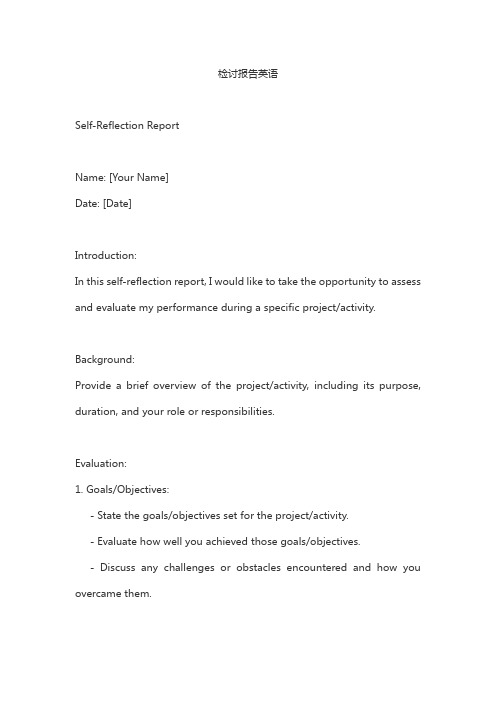
检讨报告英语Self-Reflection ReportName: [Your Name]Date: [Date]Introduction:In this self-reflection report, I would like to take the opportunity to assess and evaluate my performance during a specific project/activity.Background:Provide a brief overview of the project/activity, including its purpose, duration, and your role or responsibilities.Evaluation:1. Goals/Objectives:- State the goals/objectives set for the project/activity.- Evaluate how well you achieved those goals/objectives.- Discuss any challenges or obstacles encountered and how you overcame them.2. Skills and Knowledge:- Assess the skills and knowledge required for the project/activity.- Reflect on your own proficiency in those areas.- Identify areas where you excelled and areas that need improvement.- Explain steps taken to enhance your skills and knowledge during the project/activity.3. Collaboration and Communication:- Describe the level of collaboration and communication within the team or with others involved.- Evaluate your own contribution to teamwork and effective communication.- Discuss any difficulties faced in collaborating and communicating and how you addressed them.4. Time Management:- Reflect on how effectively you managed your time throughout the project/activity.- Discuss any instances of procrastination or poor time management and their impact.- Explain strategies implemented to improve time management skills.5. Lessons Learned:- Summarize the key lessons you have learned from the project/activity.- Reflect on how these lessons can be applied to future projects/activities.- Discuss any personal growth or development resulting from the experience.Conclusion:Provide a concluding statement summarizing your overall reflection on the project/activity. Acknowledge any achievements, areas for improvement, and future goals.Action Plan:Outline specific actions you plan to take to address areas for improvement identified during the evaluation. Set realistic and measurable goals for personal growth and development.Signature: [Your Signature]Date: [Date]Please note that the structure and content of a self-reflection report canvary depending on the context and requirements of the project/activity. The above example provides a general framework that can be customized to fit your particular situation.。
反思报告英语论文模板

IntroductionThe purpose of this reflection report is to critically analyze and evaluate my experiences, learning outcomes, and personal growth during [subject/experience/project]. This report will explore the challenges encountered, the strategies employed, and the insights gained throughout the process. By examining these aspects, I aim to provide a comprehensive understanding of my journey and identify areas for improvement.Background[Provide a brief background on the subject/experience/project, including the context, objectives, and any relevant information.]Reflection on Learning Outcomes1. Knowledge Acquisition:- [Discuss the new knowledge gained and how it contributed to your understanding of the subject/experience/project.]- [Explain how this knowledge has influenced your perspectives and skills.]2. Skills Development:- [Identify specific skills acquired or improved during the experience, such as communication, problem-solving, or technical skills.]- [Analyze how these skills have been beneficial in your personal and professional life.]3. Critical Thinking:- [Reflect on how the experience/experiment/project encouragedcritical thinking and analysis.]- [Provide examples of situations where critical thinking was crucial to achieving the desired outcome.]Reflection on Challenges and Obstacles1. Identified Challenges:- [List the challenges faced during the subject/experience/project.]- [Describe the impact of these challenges on your progress and overall experience.]2. Strategies Employed:- [Discuss the strategies used to overcome these challenges.]- [Evaluate the effectiveness of these strategies and their impact on your performance.]3. Lessons Learned:- [Summarize the key lessons learned from the challenges encountered.] - [Consider how these lessons can be applied in future endeavors.] Reflection on Personal Growth1. Self-awareness:- [Discuss how the experience/experiment/project has contributed to your self-awareness.]- [Analyze your strengths and weaknesses and how they have evolved over time.]2. Resilience:- [Reflect on the resilience developed through overcoming obstacles.]- [Describe how this resilience has influenced your approach tofuture challenges.]3. Interpersonal Skills:- [Assess the impact of the experience/experiment/project on your interpersonal skills.]- [Discuss how these skills have enhanced your ability to work collaboratively and communicate effectively.]ConclusionIn conclusion, this reflection report has provided a comprehensive overview of my experiences during [subject/experience/project]. By analyzing the learning outcomes, challenges, and personal growth, I have gained valuable insights that will undoubtedly contribute to my future endeavors. This report serves as a testament to the transformative power of learning and the importance of reflection in personal and professional development.Recommendations for Future Improvement- [Based on the analysis in this report, propose specific recommendations for future improvement.]- [Discuss how these recommendations can be implemented to enhance learning and performance in similar contexts.]References[Include any references or sources cited in the report.]---This template can be customized to fit the specific requirements of your reflection report. Make sure to fill in the placeholders with relevant information from your own experiences and learning outcomes.。
反思报告模板
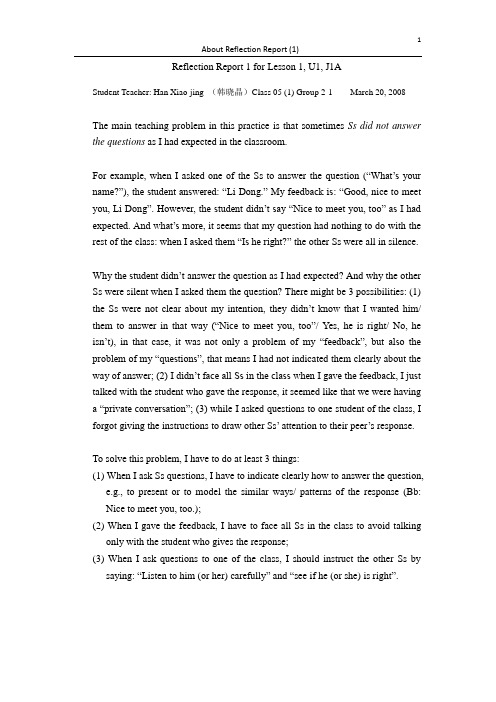
1About Reflection Report (1)Reflection Report 1 for Lesson 1, U1, J1AStudent Teacher: Han Xiao-jing (韩晓晶)Class 05 (1) Group 2-1 March 20, 2008The main teaching problem in this practice is that sometimes Ss did not answer the questions as I had expected in the classroom.For example, when I asked one of the Ss to answer the question (“What’s your name?”), t he student answered: “Li Dong.” My feedback is: “Good, nice to meet you, Li Dong”. However, t he student didn’t say “Nice to meet you, too” as I had expected. And what’s more, it seems that my question had nothing to do with the rest of the class: w hen I asked them “Is he right?” the other Ss were all in silence.Why the student didn’t answer the question as I had expected? And why the other Ss were silent when I asked them the question? There might be 3 possibilities: (1) the Ss were not clear about my intention, they didn’t know that I wanted him/ them to answer in that way (“Nice to meet you, too”/ Yes, he is right/ No, he isn’t), in that case, it was not only a problem of my “feedback”, but also the problem of my “questions”, that means I had not indicated them clearly about the way of answer; (2) I didn’t face all Ss in the class when I gave the feedback, I just talked with the student who gave the response, it seemed like that we were having a “private conversation”; (3) while I asked questions to one student of the class, I forgot giving the instructions to draw other Ss’ attention to their peer’s response.To solve this problem, I have to do at least 3 things:(1) When I ask Ss questions, I have to indicate clearly how to answer the question,e.g., to present or to model the similar ways/ patterns of the response (Bb:Nice to meet you, too.);(2) When I gave the feedback, I have to face all Ss in the class to avoid talkingonly with the student who gives the response;(3) When I ask questions to one of the class, I should instruct the other Ss bysaying: “Listen to him (or her) carefully” and “see if he (or she) is right”.。
英语反思报告总结通用模板
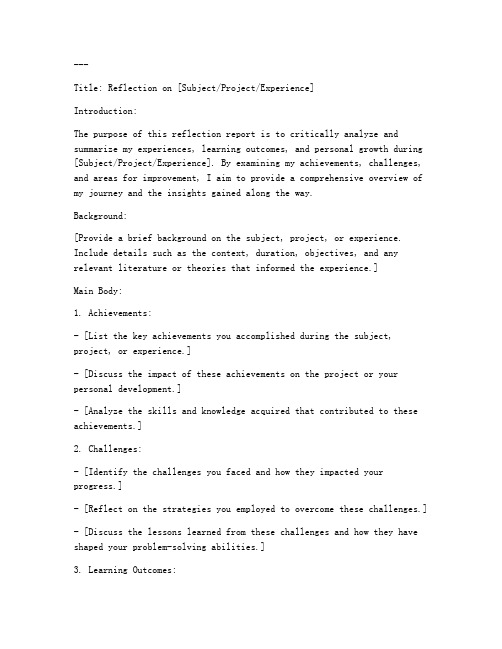
---Title: Reflection on [Subject/Project/Experience]Introduction:The purpose of this reflection report is to critically analyze and summarize my experiences, learning outcomes, and personal growth during [Subject/Project/Experience]. By examining my achievements, challenges, and areas for improvement, I aim to provide a comprehensive overview of my journey and the insights gained along the way.Background:[Provide a brief background on the subject, project, or experience. Include details such as the context, duration, objectives, and any relevant literature or theories that informed the experience.]Main Body:1. Achievements:- [List the key achievements you accomplished during the subject, project, or experience.]- [Discuss the impact of these achievements on the project or your personal development.]- [Analyze the skills and knowledge acquired that contributed to these achievements.]2. Challenges:- [Identify the challenges you faced and how they impacted your progress.]- [Reflect on the strategies you employed to overcome these challenges.]- [Discuss the lessons learned from these challenges and how they have shaped your problem-solving abilities.]3. Learning Outcomes:- [Describe the specific learning outcomes you achieved, both in terms of knowledge and skills.]- [Relate these outcomes to the broader objectives of the subject, project, or experience.]- [Evaluate the effectiveness of the learning methods and resources utilized.]4. Personal Growth:- [Reflect on the personal growth you experienced as a result of the subject, project, or experience.]- [Discuss how this experience has influenced your self-awareness, confidence, and motivation.]- [Analyze the changes in your attitudes, values, and behaviors.]5. Areas for Improvement:- [Identify areas where you believe you could have performed better or where there is room for growth.]- [Discuss the reasons for these shortcomings and propose strategies for improvement.]- [Consider how these areas for improvement will be addressed in future endeavors.]Conclusion:Reflecting on [Subject/Project/Experience] has been a valuable and enlightening process. It has allowed me to recognize my strengths, acknowledge my limitations, and identify areas for future development. The experiences gained have not only contributed to my professional and academic growth but have also enriched my personal life. As I move forward, I am committed to applying the lessons learned and the insights gained to continue my journey of personal and professional development.References:[Include any relevant references to literature, research, or resources that were consulted during the subject, project, or experience.]---This template can be adapted to various subjects, projects, or experiences, ensuring that the reflection report remains comprehensive and insightful.。
成果反思报告模板英语
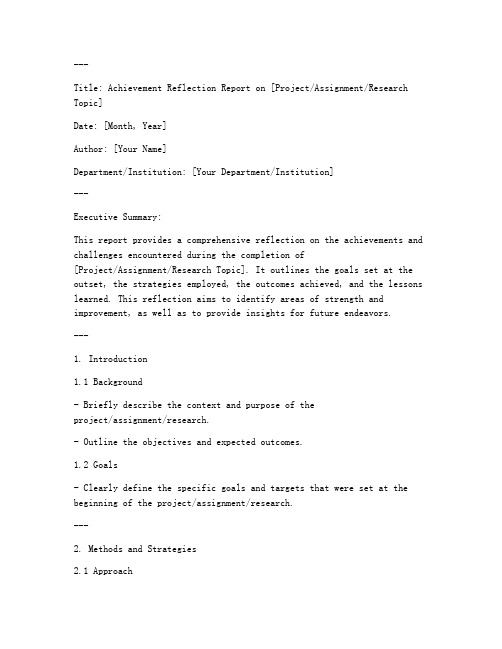
---Title: Achievement Reflection Report on [Project/Assignment/Research Topic]Date: [Month, Year]Author: [Your Name]Department/Institution: [Your Department/Institution]---Executive Summary:This report provides a comprehensive reflection on the achievements and challenges encountered during the completion of[Project/Assignment/Research Topic]. It outlines the goals set at the outset, the strategies employed, the outcomes achieved, and the lessons learned. This reflection aims to identify areas of strength and improvement, as well as to provide insights for future endeavors.---1. Introduction1.1 Background- Briefly describe the context and purpose of theproject/assignment/research.- Outline the objectives and expected outcomes.1.2 Goals- Clearly define the specific goals and targets that were set at the beginning of the project/assignment/research.---2. Methods and Strategies2.1 Approach- Explain the methodology used to achieve the goals.- Describe the tools, techniques, and resources employed.2.2 Implementation- Detail the steps taken to implement the strategies.- Discuss any challenges faced during the implementation process and how they were addressed.---3. Achievements3.1 Milestones- List the key milestones achieved during theproject/assignment/research.- Provide evidence or data to support the achievements.3.2 Outcomes- Describe the tangible and intangible outcomes of theproject/assignment/research.- Discuss how the outcomes align with the initial goals.---4. Challenges and Limitations4.1 Identified Challenges- Identify the challenges and obstacles encountered during theproject/assignment/research.- Analyze the causes of these challenges.4.2 Limitations- Acknowledge any limitations in the project/assignment/research.- Discuss how these limitations impacted the outcomes.---5. Lessons Learned5.1 Key Takeaways- Summarize the key lessons learned from the project/assignment/research.- Discuss how these lessons can be applied to future endeavors.5.2 Recommendations- Provide recommendations for improving futureprojects/assignments/research based on the lessons learned.- Suggest specific actions or changes that could lead to better outcomes.---6. Conclusion6.1 Summary of Findings- Recap the main findings of the report, highlighting the achievements, challenges, and lessons learned.6.2 Final Thoughts- Reflect on the overall experience and the impact of theproject/assignment/research on personal and professional development.- Express gratitude to any individuals or organizations that supported the project/assignment/research.---7. Appendices- Include any additional materials that support the report, such as graphs, charts, or detailed data.---References- List any sources or references cited in the report.---End of Report---This template can be customized according to the specific requirements of the project/assignment/research. The aim is to provide a structured and comprehensive reflection that not only showcases the achievements but also identifies areas for growth and improvement.。
- 1、下载文档前请自行甄别文档内容的完整性,平台不提供额外的编辑、内容补充、找答案等附加服务。
- 2、"仅部分预览"的文档,不可在线预览部分如存在完整性等问题,可反馈申请退款(可完整预览的文档不适用该条件!)。
- 3、如文档侵犯您的权益,请联系客服反馈,我们会尽快为您处理(人工客服工作时间:9:00-18:30)。
Bestandsnaam: Reflection Report Auteur: walenkampwalenkamp Versie nr.: 1
Datum 31 mei 2012 1
Reflection Report
To keep you on track with the acquisition of your international competencies you are advised to work on your reflection report every week. Generally you can distinguish three phases in your foreign adventure:
Start-up phase: settling in, what strikes you, challenges, loneliness,
Middle phase: What has changed in your original goals, challenges and tasks, how are your expectations being met in reality, are you able to analyze and understand your experiences.
Final phase: Finalize your reflection report, prepare for ‘culture shock’ upon return, focus on competencies acquired and capitalization.
So you know what to do: acquire international competencies, and you will know what to produce to show what you have acquired (Reflection Report). The question now is: how are you going to consciously and purposefully acquire these competencies. The Vademecum will guide you.
Contents
1. Experiences: keep track of experiences, and how they help you acquiring international
competencies.
a. What was the experience that made the biggest impression on you. What effect did it
have on you?
b. What was your best/worst experience?
c. What are the most important things you learned?
d. Go back to the challenges you anticipated before your departure , and to the
competencies you thought you would need to cope with them. How do they correspond
with your real experiences. Discuss what happened.
e. What challenges did you meet and did you cope with them?
f. Which competencies did you acquire, to what extent and how did you acquire them?
2. Prepare for your return: what do you expect, how are you going to handle that?
3. Capitalize on your study or internship abroad.
a. Explain what you have experienced and how your expectations were met, or not.
b. List the challenges you expected and the ones you actually encountered, and explain how
you coped with them
c. Discuss the international (professional, academic, linguistic, intercultural and personal)
competencies you acquired and how they are of use in your future career.
d. Explain what makes you a better candidate for a job than someone who did not go abroad.
4. Feedback on preparation module. We would like to hear from you what you found useful and
what not, what you have missed and should be included. What can be done better and how.。
